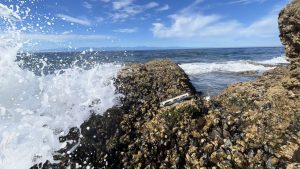FHL468A | Summer A 2024
Ecological Biomechanics
This graduate level course uses an engineering perspective to evaluate the mechanical design of marine organisms. We will study the basic mechanics of fluids and solids to develop an understanding of the diversity of ways organisms construct materials, organize body plans, and interact with other organisms and their environment. The first three weeks will introduce biomechanical theories and techniques through lectures, laboratory exercises, and field activities. The final two weeks are devoted to independent student research projects.
The 2024 course focuses on two major themes:
1) Ecomechanics. Organisms must perform within the constraints of their physical environment. How have environmental parameters guided the evolution of organismal form and function, and how will future shifts in climate (temperature, water motion, ocean acidification, etc.) affect ecological performance?
2) Marine Biomaterials. Material scientists increasingly look to nature for inspiration in the design of high-performance materials, such as the strong underwater adhesives of barnacles, the tough durable tethers of mussels, and the fracture resistant shells of snails. To date, relatively few marine biomaterials have been adequately characterized; the rich diversity of marine flora and fauna in the San Juan Islands will undoubtedly provide for novel observations.
Enrollment is limited to 18 students and scholarships are available. Late applications will be considered if space is available.

